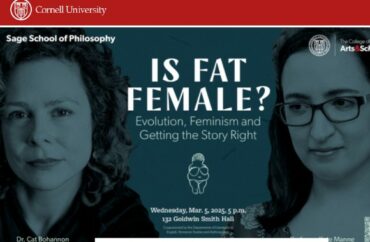
Scholar says the ‘male norm is affecting’ scientific knowledge about mammals
Feminist scholars discussed their concerns about science being too male, “hetero,” and “feto-centric” during an online event Thursday at Cornell University.
The talk, “Is Fat Female? Evolution, Feminism, and Getting the Story Right,” featured scholar Cat Bohannon and philosophy Professor Kate Manne. Bohannon is the author of the best-selling book “Eve: How The Female Body Drove 200 Million Years of Evolution.”
“The male norm is a thing that we are trying to fix from the ground up right now in biological and biomedical research,” Bohannon said during the Cornell Keynotes webinar.
During the hour-long event, Manne and Bohannon primarily focused on scientific research and its impact on women, but they also brought up racism, abortion, and LGBTQ issues – including research on elephants’ sex activities.
In her research, Bohannon said she found that female bodies often are not “normalized” in scientific and medical research.
In experiments, male rats are used more often than females, in part, because they are cheaper, and, until a couple of decades ago, women of reproductive age frequently were excluded from clinical trials, she said. As a result, society knows less about things like the impact of opioids on women and treatment options for various medical conditions, she said.
“It means that we often lack information about, are these drugs affecting women more when it comes to things like depression, anxiety, [and] suicidality. There are really big unanswered questions … we haven’t thought to ask because, again, we’re centering male bodies in a way that is deleterious for female health,” she said.
Manne praised Bohannon’s work for focusing on the “feminist philosophy of science.” She brought up examples of “androcentric bias” that have “distorted some of our observations over the years.”
One involved male scientists studying the female orgasm in monkeys and ignoring same-sex activity that led to more enjoyable sex for the females.
The “male norm is affecting the kind of science we’re able to do and the kind of knowledge that we’re able to gather about mammals generally,” Manne said.
Bohannon said another problem is “hetero assumptions” in science due to “queasiness” — and “obviously homophobia.”
She brought up research that has been done on elephants’ sexual activities.
When male and female elephants mate for the purpose of producing offspring, “it’s very fast,” she said. However, when the males are alone together for long periods of time, she said some will “form these tightly, intimately-bonded relationships and have penetrative sex for up to an hour.”
“It’s hard to say whether or not your basic wild elephant is straight,” she said, later adding, “Who knows what sexuality is exactly for animal friends, but animals are very queer.”
MORE: Professor condemns ‘anti-trafficking movement,’ ‘deviant framing’ of ‘sex workers’
Society also has been too “feto-centric,” or centered on the fetus, Bohannon said.
Up until the 1990s in human clinical trials, “we purposefully were not studying human women of reproductive age because we were afraid that we were going to screw up their babies,” Bohannon said.
“Now, as a woman, I would love to be cared for, regardless of whether or not I make a baby … that feto-centric thing is an issue,” she said. “But nevertheless, it’s not like it’s a bad idea to try to reduce birth defects.”
However, that also “meant that for decades while drugs were coming onto the market, they may not have been tested in females at all … and so we were the subjects for a very long time,” she said.
But Manne said the problem is bigger than just a lack of research and knowledge centered around women.
She brought up Texas’s abortion ban to make the case that women’s unnecessary suffering can be caused by “willful ignorance” and “sheer “misogyny.”
She cited a recent report about sepsis rates spiking among pregnant women after Texas banned abortion. But instead of fixing the problem, she said politicians have “doubled down” on banning abortions.
Bohannon agreed, saying, “I think it’s absolutely coming out of misogyny, … straight up hatred for women and punishing women for being women, and certainly punishing women for sex, but it’s also the pain of admitting you did a terrible thing and now people are suffering horribly.”
She said she worries about the “feto-centric view where our babies matter more than our girls.”
On the issue of fatness, Bohannon said society has a poor view of fat, especially on women.
She said new understandings about the different types and functions of fat in the body suggest it is an organ, and removing it via liposuction – or dieting while pregnant — can be harmful to women and their unborn babies.
“Fat has so many independent and important roles in maintaining a body’s health,” including creating immune cells and playing a role in the endocrine system, but a lot remains unknown — and is worthy of research, she said.
When asked how to avoid “transphobia while centering female bodies,” Bohannon replied by saying research should include representative samples of the population in clinical trials. Currently, she said “quite a lot” of clinical trials “continue to be white.”
She said researchers should be specifically studying “transgender females” (biological males), too.
MORE: Professor: Gender studies made me realize X-Men’s Wolverine is ‘toxic’ masculinity
IMAGE: Cornell University
Like The College Fix on Facebook / Follow us on Twitter






Please join the conversation about our stories on Facebook, Twitter, Instagram, Reddit, MeWe, Rumble, Gab, Minds and Gettr.